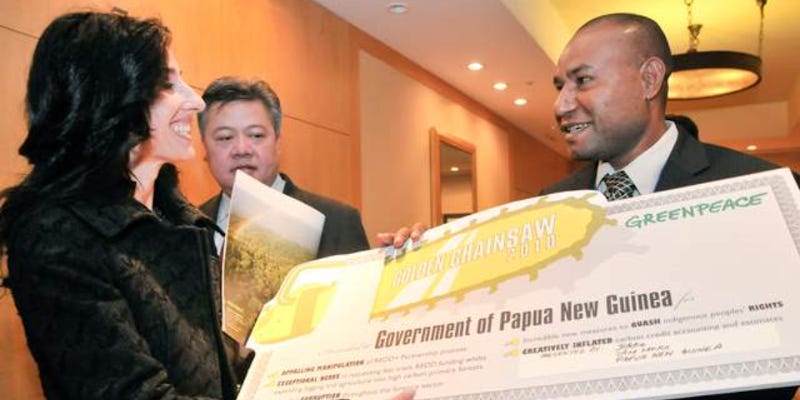
Yesterday, Greenpeace presented the Papua New Guinea government with a Golden Chainsaw award “for asking for REDD money whilst continuing with rampant logging, failing to respect indigenous rights and denying NGO input into REDD discussions”.
The award was accepted by Federica Bietta, who is representing the PNG government at the UN Convention on Biodiversity meeting in Nagoya, Japan.
Federica Bietta is the Director of Finance and Administration at the Columbia Business School, Deputy Director of the Coalition for Rainforest Nations and co-chair of the REDD+ Partnership as a representative of PNG. She looked happy enough to receive the award, but, as Greenpeace forest campaigner Sam Moko notes, “really it’s sad and unfortunate for the Government of PNG to receive Greenpeace’s Golden Chainsaw award – normally reserved for illegal and destructive logging companies.”
Moko added that this was the first time he had met Bietta:
I’ve been working on forestry in PNG for 9 years and I’ve never come across her before. Today was a good opportunity to meet her face to face – after all she is the face of PNG for important talks on climate and forests.
Greenpeace also released a report on the sidelines of the CBD meeting in Nagoya, titled “Papua New Guinea: Not ready for REDD.”
The report slams the PNG government’s preparation for REDD so far:
The poor governance and entrenched corruption that has long characterised the PNG logging industry, together with a refusal to accept conditions for REDD funding and a growing dismissal of indigenous peoples’ rights, means PNG is not currently ready for REDD funding.
The report stresses the urgency of protecting PNG’s forests. Industrial logging has destroyed huge areas of forest without bringing benefits such as employment or improved education and health-care. A 2008 report by scientists at the University of Papua New Guinea Remote Sensing Centre and the Australian National University estimates that by 2021, “most of the areas accessible to loggers will have been cleared or degraded.”
The Greenpeace report states that instead of attempting to address deforestation, PNG’s national policy on REDD, “aims to maximise potential international REDD funding rather than improve institutional and political capacity in PNG.”
Corruption within PNG’s forest industry, disregard for land owner rights, inflated estimations of likely benefits from REDD and a lack of effective institutional systems in place do not engender confidence in the country’s ability to manage a funded institutional transition to a low carbon economy.
Greenpeace is not opposed to REDD and the report notes the need for international REDD finance. Neither is Greenpeace anti-development: “The people of PNG, most of whom live a subsistence life relying on the forest, also have the right to development and improving their livelihoods.” The challenge is for PNG to “transform its policies, laws and institutions, if it is to ready itself for increased international assistance via REDD.”
Sam Moko sums up the problem concisely:
“The Government of PNG is attempting to get its hands on billions of dollars of international REDD funding. But instead of protecting rainforests at home, they are corruptly approving widespread logging and denying the rights of indigenous people who own the land.”
Unfortunately, the PNG government does not appear to be listening. In email comments to Reuters, a government spokeswoman wrote that PNG “was building a consensus and bolstering institutions.”
The reality, however, is that PNG has hired consulting firm McKinsey to write its REDD reports. McKinsey’s consultants also deal with questions during meetings about PNG’s REDD implementation. PNG NGO Eco-Forestry Forum commented, “This leaves us with the conclusion that OCCD and DEC does have a capacity issue that has not been admitted.”
Meanwhile, an Italian woman, Federica Bietta, who has apparently never even been to PNG is representing PNG at international meetings and as the co-chair of the REDD+ Partnership.
The PNG government spokeswoman told Reuters that,
“We regret that Greenpeace directs all its effort into a glossy but superficial report instead of trying to solve the problems together with the relevant Government departments, NGOs and development partners.”
Had the spokeswoman bothered to read the report, she would have discovered that Greenpeace is trying to do precisely that. Greenpeace makes a series of constructive recommendations in the report.
There is, however, a catch. “Money by itself wont fix corruption – it could just make things worse,” as Sam Moko points out. Greenpeace’s report expands on the theme:
[A] major challenge is for PNG to transform its policies, laws and institutions, if it is to ready itself for increased international assistance via REDD. It will need to bring down the high levels of corruption and improve governance if donors are to be reassured that REDD financing can achieve the goals of emissions reductions, forest conservation and climate-compatible development.
Unfortunately, the government appears completely incapable of bringing down the high levels of corruption associated with the destruction of PNG’s forests. Until it does, PNG will remain not ready for REDD.





Comments following the original post on REDD-Monitor.org are archived here: https://archive.ph/wXUOb#selection-4361.0-4361.10